36 start with V start with V
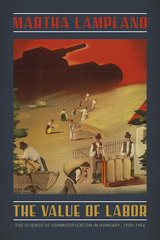
Lampland trains her eye on the scientific claims of modern economic modeling, using Hungary’s unique vantage point to show how theories, policies, and techniques for commodifying agrarian labor that were born in the capitalist era were adopted by the socialist regime as a scientifically designed wage system on cooperative farms. Paying attention to the specific historical circumstances of Hungary, she explores the ways economists and the abstract notions they traffic in can both shape and be shaped by local conditions, and she compellingly shows how labor can be commodified in the absence of a labor market. The result is a unique account of economic thought that unveils hidden but necessary continuities running through the turbulent twentieth century.
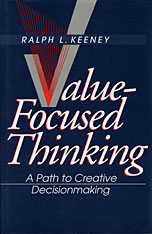
The standard way of thinking about decisions is backwards, says Ralph Keeney: people focus first on identifying alternatives rather than on articulating values. A problem arises and people react, placing the emphasis on mechanics and fixed choices instead of on the objectives that give decisionmaking its meaning. In this book, Keeney shows how recognizing and articulating fundamental values can lead to the identification of decision opportunities and the creation of better alternatives. The intent is to be proactive and to select more attractive decisions to ponder before attempting any solutions.
Keeney describes specific procedures for articulating values by identifying and structuring objectives qualitatively, and he shows how to apply these procedures in various cases. He then explains how to quantify objectives using simple models of values. Such value analysis, Keeney demonstrates, can yield a full range of alternatives, thus converting decision problems into opportunities. This approach can be used to uncover hidden objectives, to direct the collection of information, to improve communication, to facilitate collective decisionmaking, and to guide strategic thinking. To illustrate these uses, Keeney shows how value-focused thinking works in many business contexts, such as designing an integrated circuit tester and managing a multibillion-dollar utility company; in government contexts, such as planning future NASA space missions and deciding how to transport nuclear waste to storage sites; and in personal contexts, such as choosing career moves and making wise health and safety decisions.
An incisive, applicable contribution to the art and science of decisionmaking, Value-Focused Thinking will be extremely useful to anyone from consultants and managers to systems analysts and students.
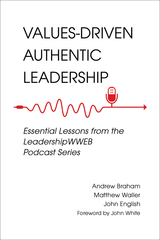
In Values-Driven Authentic Leadership: Essential Lessons from the LeadershipWWEB Podcast Series, Andrew Braham, Matthew Waller, and John English examine the intersection of values, authenticity, and leadership. Drawing upon numerous conversations with a wide range of professional leaders, including several Fortune 500 CEOs, the authors identify six key opportunities for leadership growth: having a mentor, being in a group, knowing yourself, navigating transitions, being a mentor, and values and company culture. By sharing their own experiences, Braham, Waller, English, and the leaders they interview bring the facets of authentic leadership to life with personal insight.
Whether you are a mentor or a mentee, a student or a professional, Values-Driven Authentic Leadership will help guide you on your own leadership journey.
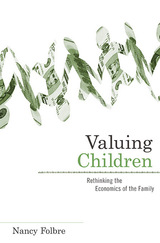
Nancy Folbre challenges the conventional economist's assumption that parents have children for the same reason that they acquire pets--primarily for the pleasure of their company. Children become the workers and taxpayers of the next generation, and "investments" in them offer a significant payback to other participants in the economy.
Yet parents, especially mothers, pay most of the costs. The high price of childrearing pushes many families into poverty, often with adverse consequences for children themselves.
Parents spend time as well as money on children. Yet most estimates of the "cost" of children ignore the value of this time. Folbre provides a startlingly high but entirely credible estimate of the value of parental time per child by asking what it would cost to purchase a comparable substitute for it.
She also emphasizes the need for better accounting of public expenditure on children over the life cycle and describes the need to rethink the very structure and logic of the welfare state. A new institutional structure could promote more cooperative, sustainable, and efficient commitments to the next generation.

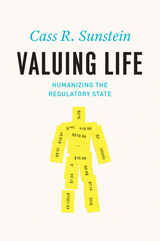
As OIRA Administrator, Sunstein helped oversee regulation in a broad variety of areas, including highway safety, health care, homeland security, immigration, energy, environmental protection, and education. This background allows him to describe OIRA and how it works—and how it can work better—from an on-the-ground perspective. Using real-world examples, many of them drawn from today’s headlines, Sunstein makes a compelling case for improving cost-benefit analysis, a longtime cornerstone of regulatory decision-making, and for taking account of variables that are hard to quantify, such as dignity and personal privacy. He also shows how regulatory decisions about health, safety, and life itself can benefit from taking into account behavioral and psychological research, including new findings about what scares us, and what does not. By better accounting for people’s fallibility, Sunstein argues, we can create regulation that is simultaneously more human and more likely to achieve its goals.
In this highly readable synthesis of insights from law, policy, economics, and psychology, Sunstein breaks down the intricacies of the regulatory system and offers a new way of thinking about regulation that incorporates human dignity– and an insistent focus on the consequences of our choices.

NatureVest founder William Ginn outlines the emerging private sector investing opportunities in natural assets such as green infrastructure, forests, soils, and fisheries. The first part of Valuing Nature examines the scope of nature-based impact investing while also presenting a practical overview of its limitations and the challenges facing the private sector. The second part of the book offers tools for investors and organizations to consider as they develop their own projects and tips on how nonprofits can successfully navigate this new space. Case studies from around the world demonstrate how we can use private capital to achieve more sustainable uses of our natural resources without the unintended consequences plaguing so many of our current efforts.
Valuing Nature provides a roadmap for conservation professionals, nonprofit managers, and impact investors seeking to use market-based strategies to improve the management of natural systems.
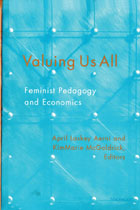
This volume collects pioneering work on the integration of feminist pedagogy in economics. Part 1 introduces a vision of feminist pedagogy, explains the importance of developing feminist pedagogy in economics, and proposes a model for achieving feminist pedagogy in economics that suggests changes in both course content and teaching methods. Part 2 reveals how current course content is narrowly defined and demonstrates how content can be altered to be more inclusive. Included are an analysis of current textbook treatments and examples of broadening discussions of labor supply models, U.S. poverty, and stereotyping, as well as general overviews of macro- and microeconomic courses. Part 3 reports on current disparities in economics education by gender and provides alternative teaching strategies for correcting this problem, including the service learning, peer review, e-mail discussion lists, case studies, internships, and collaborative learning.
The contributors incorporate their vision of a new pedagogy with important economic concepts emphasizing equity as well as efficiency, cooperation as well as competition, and inter-dependence as well as independence. The volume will be a valuable resource for college faculty teaching economics in the United States, as well as to those teaching in related disciplines who want to design exercises that promote a more inclusive classroom environment through changes in both content and teaching methods.
April Laskey Aerni is Associate Professor of Economics, Nazareth College of Rochester. KimMarie McGoldrick is Associate Professor of Economics, University of Richmond.

Here, Peart and Levy tackle the issues of racism, eugenics, hierarchy, and egalitarianism in classical economics and take a broad view of classical economics' doctrine of human equality. Responding to perennial accusations from the left and the right that the market economy has created either inequality or too much equality, the authors trace the role of the eugenics movement in pulling economics away from the classical economist's respect for the individual toward a more racist view at the turn of the century.
The "Vanity of the Philosopher" reveals the consequences of hierarchy in social science. It shows how the "vanity of the philosopher" has led to recommendations that range from the more benign but still objectionable "looking after" paternalism, to overriding preferences, and, in the extreme, to eliminating purportedly bad preferences. The authors suggest that an approach that abstracts from difference and presumes equal competence is morally compelling.
"People in the know on intellectual history and economics await the next book from Peart and Levy with much the same enthusiasm that greets a new Harry Potter book in the wider world. This book delivers the anticipated delights big time!"
-William Easterly, Professor of Economics and Africana Studies, NYU, and non-resident Senior Fellow, Center for Global Development
"In their customary idiosyncratic manner, Sandra Peart and David Levy reexamine the way in which the views of classical economists on equality and hierarchy were shifted by contact with scholars in other disciplines, and the impact this had on attitudes towards race, immigration, and eugenics. This is an imaginative and solid work of scholarship, with an important historical message and useful lessons for scholars today."
-Stanley Engerman, John Munro Professor of Economics and Professor of History, University of Rochester
Sandra J. Peart, Professor of Economics at Baldwin-Wallace College, has published articles on utilitarianism, the methodology of J. S. Mill, and the transition to neoclassicism. This is her fourth book. David M. Levy is Professor of Economics at George Mason University and Director of the Center for Study of Public Choice. This is his third book.

In Varieties of State Regulation, Yukyung Yeo explores how, despite China’s increasing integration into the global market, the Chinese central party-state continues to oversee the most strategic sectors of its economy. Since the 1990s, as major state firms were spun off from the ministries that managed them under the central planning system, the nature of the state in governing the economy has been remarkably transformed into that of a regulator.
Based on over 100 interviews conducted with Chinese central and local officials, firms, scholars, journalists, and consultants, the book demonstrates that the form of central state control varies considerably across leading industrial sectors, depending on the dominant mode of state ownership, conception of control, and governing structure. By analyzing and comparing institutional dynamics across various sectors, Yeo explains variations in the pattern of China’s regulation of its economy. She contrasts the regulation of the automobile industry, a relatively decentralized sector, with the highly-centralized telecommunications industry, and demonstrates how China’s central party-state maintains regulatory authority over key local state-owned enterprises. Placing these findings in historical and comparative contexts, the book presents the evolution and current practice of state regulation in China and examines its compatibility with other contemporary government practices.

“An incisive history of the venture-capital industry.”
—New Yorker
“An excellent and original economic history of venture capital.”
—Tyler Cowen, Marginal Revolution
“A detailed, fact-filled account of America’s most celebrated moneymen.”
—New Republic
“Extremely interesting, readable, and informative…Tom Nicholas tells you most everything you ever wanted to know about the history of venture capital, from the financing of the whaling industry to the present multibillion-dollar venture funds.”
—Arthur Rock
“In principle, venture capital is where the ordinarily conservative, cynical domain of big money touches dreamy, long-shot enterprise. In practice, it has become the distinguishing big-business engine of our time…[A] first-rate history.”
—New Yorker
VC tells the riveting story of how the venture capital industry arose from America’s longstanding identification with entrepreneurship and risk-taking. Whether the venture is a whaling voyage setting sail from New Bedford or the latest Silicon Valley startup, VC is a state of mind as much as a way of doing business, exemplified by an appetite for seeking extreme financial rewards, a tolerance for failure and experimentation, and a faith in the promise of innovation to generate new wealth.
Tom Nicholas’s authoritative history takes us on a roller coaster of entrepreneurial successes and setbacks. It describes how iconic firms like Kleiner Perkins and Sequoia invested in Genentech and Apple even as it tells the larger story of VC’s birth and evolution, revealing along the way why venture capital is such a quintessentially American institution—one that has proven difficult to recreate elsewhere.
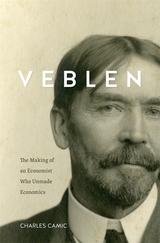
A bold new biography of the thinker who demolished accepted economic theories in order to expose how people of economic and social privilege plunder their wealth from society’s productive men and women.
Thorstein Veblen was one of America’s most penetrating analysts of modern capitalist society. But he was not, as is widely assumed, an outsider to the social world he acidly described. Veblen overturns the long-accepted view that Veblen’s ideas, including his insights about conspicuous consumption and the leisure class, derived from his position as a social outsider.
In the hinterlands of America’s Midwest, Veblen’s schooling coincided with the late nineteenth-century revolution in higher education that occurred under the patronage of the titans of the new industrial age. The resulting educational opportunities carried Veblen from local Carleton College to centers of scholarship at Johns Hopkins, Yale, Cornell, and the University of Chicago, where he studied with leading philosophers, historians, and economists. Afterward, he joined the nation’s academic elite as a professional economist, producing his seminal books The Theory of the Leisure Class and The Theory of Business Enterprise. Until late in his career, Veblen was, Charles Camic argues, the consummate academic insider, engaged in debates about wealth distribution raging in the field of economics.
Veblen demonstrates how Veblen’s education and subsequent involvement in those debates gave rise to his original ideas about the social institutions that enable wealthy Americans—a swarm of economically unproductive “parasites”—to amass vast fortunes on the backs of productive men and women. Today, when great wealth inequalities again command national attention, Camic helps us understand the historical roots and continuing reach of Veblen’s searing analysis of this “sclerosis of the American soul.”
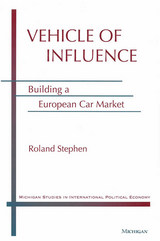
The book begins by reviewing the history of the EU and the logic of regional free trade, and goes on to develop a political explanation for the kinds of changes that actually occurred. The author argues that European automakers enjoyed a privileged place in the political arena, albeit one much transformed by the new institutions of the EU. Therefore, these firms often significantly influenced regional policy outcomes. The argument is applied to policymaking in the important areas of environmental regulation, trade, subsidies, and anti-trust regulation.
This work lies at the intersection of business, economics, and political science and is of interest to both experts and non-specialists with an interest in the tremendous economic and political changes brought about by the creation of a united Europe and, more generally, by the worldwide process of regional economic integration. Academics, professionals, businessmen, and leaders in government all have something to learn from the way in which firms and governments combined to build the largest car market in the world.
Roland Stephen is Assistant Professor in the Department of Political Science, North Carolina State University.


A consultant with McKinsey & Company surveys the international aluminum industry and asks why its various activities are divided among firms in the way that they are. These components include the minding of bauxite, its refining into alumina, aluminum smelting, fabrication, and manufacture of the final product. What is it about this industry that encourages joint ventures in some cases, long-term contracts in others, and vertical integration and merger in still others?
The author identifies and analyzes the factors which motivate firms to adopt one or another of these patterns of doing business. He draws on and extends recent developments in theory relating to the operation of markets and organizations, and tests the power of theories to explain what is observed in the industry. He has assembled a great deal of empirical evidence, focusing on the United States, Japan, and Australia. The book should become the standard study of the aluminum industry.


In the late 1980s, most of the world still associated Vietnam with resistance and war, hardship, refugees, and a mismanaged planned economy. During the 1990s, by contrast, major countries began to see Vietnam as both a potential partner and a strategically significant actor—particularly in the competition between the United States and an emerging China—and international investors began to see Vietnam as a land of opportunity.
Vietnam remains a Leninist party-state ruled by the Communist Party of Vietnam that has reconciled the supposedly irreconcilable: a one-party system and a market-based economy linked to global value chains. For the Party stability is crucial and, recently, increasing economic openness has been combined with growing political control and repression.
This book, undertaken by scholars from Vietnam, North America, and Europe, focuses on how the country’s governance shapes its politics, economy, social development, and relations with the outside world, as well as on the reforms required if Vietnam is to become a sustainable and modern high-income nation in the coming decades.
Despite the challenges, including systemic ones, the authors remain optimistic about Vietnam’s future, noting the evident vitality of a determined society.

In the late 1980s, most of the world still associated Vietnam with resistance and war, hardship, refugees, and a mismanaged planned economy. During the 1990s, by contrast, major countries began to see Vietnam as both a potential partner and a strategically significant actor—particularly in the competition between the United States and an emerging China—and international investors began to see Vietnam as a land of opportunity.
Vietnam remains a Leninist party-state ruled by the Communist Party of Vietnam that has reconciled the supposedly irreconcilable: a one-party system and a market-based economy linked to global value chains. For the Party stability is crucial and, recently, increasing economic openness has been combined with growing political control and repression.
This book, undertaken by scholars from Vietnam, North America, and Europe, focuses on how the country’s governance shapes its politics, economy, social development, and relations with the outside world, as well as on the reforms required if Vietnam is to become a sustainable and modern high-income nation in the coming decades.
Despite the challenges, including systemic ones, the authors remain optimistic about Vietnam’s future, noting the evident vitality of a determined society.
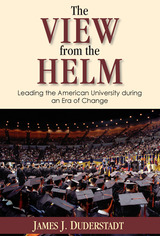
Widely regarded as one of the most active and publicly engaged university presidents in modern academia, Duderstadt—who led the University of Michigan from 1988 to 1996—presided over a period of enormous change, not only for his institution, but for universities across the country. His presidency was a time of growth and conflict: of sweeping new affirmative-action and equal-opportunity programs, significant financial expansion, and reenergized student activism on issues from apartheid to codes of student conduct.
Under James Duderstadt’s stewardship, Michigan reaffirmed its reputation as a trailblazer among universities. Part memoir, part history, part commentary, The View from the Helm extracts general lessons from his experiences at the forefront of change in higher education, offering current and future administrators a primer on academic leadership and venturing bold ideas on how higher education should be steered into the twenty-first century.

In spite of the hopes raised and achievements attained by the “Green Revolution,” the less developed rural countries of the world still must struggle for economic growth. Social scientists now focus on the human dimension of development. They search for change agents—men and women who have the initiative to cast aside traditional techniques and who are willing to introduce modern methods to their communities.
The Village Entrepreneur is a timely update on the new strategy of development. With financial backing from the Ford Foundation and the Indian government, Wayne G. Broehl and his associates undertook a comprehensive study of the village entrepreneur in South India. They interviewed hundreds of rural businessmen and attempted to pinpoint the qualities that distinguished change agents from their tradition-bound comrades. Further, they attempted to define the ways in which these agents can be used as conduits of progress. A significant section of the book describes a pilot program established to engender innovative attitudes. The book also provides a working model that will help apply the concept of change agents to other fields and other countries.
A categorical, but controversial, assumption of this work is that change is the sine qua non of development. Broehl believes that such change will necessarily be both economic and social and is likely to be political as well. Realistically presented and forcefully expressed, his findings are a strong contribution to recent development theory.

Greenport today boasts a population that is one-third Hispanic. Gordon contends that these immigrants have effectively saved the town’s economy by taking low-skill jobs, increasing the tax base, filling local schools, and patronizing local businesses. Greenport’s seaside beauty still attracts summer tourists, but it is only with the support of the local Latino workforce that elegant restaurants and bed-and-breakfasts are able to serve these visitors. For Gordon the picture is complex, because the wave of immigrants also presents the town with challenges to its services and institutions. Gordon’s portraits of local immigrants capture the positive and the negative, with a cast of characters ranging from a Guatemalan mother of three, including one child who is profoundly disabled, to a Colombian house painter with a successful business who cannot become licensed because he remains undocumented. Village of Immigrants weaves together these people’s stories, fears, and dreams to reveal an environment plagued by threats of deportation, debts owed to coyotes, low wages, and the other bleak realities that shape the immigrant experience—even in the charming seaport town of Greenport.
A timely contribution to the national dialogue on immigration, Gordon’s book shows the pivotal role the American small town plays in the ongoing American immigrant story—as well as how this booming population is shaping and reviving rural communities.

A robust historical case study that demonstrates how village development became central to the rhetoric and practice of statecraft in rural Ghana.
Combining oral histories with decades of archival material, Village Work formulates a sweeping history of twentieth-century statecraft that centers on the daily work of rural people, local officials, and family networks, rather than on the national governments and large-scale plans that often dominate development stories. Wiemers shows that developmentalism was not simply created by governments and imposed on the governed; instead, it was jointly constructed through interactions between them.
The book contributes to the historiographies of development and statecraft in Africa and the Global South by
- emphasizing the piecemeal, contingent, and largely improvised ways both development and the state are comprised and experienced
- providing new entry points into longstanding discussions about developmental power and discourse
- unsettling common ideas about how and by whom states are made
- exposing the importance of unpaid labor in mediating relationships between governments and the governed
- showing how state engagement could both exacerbate and disrupt inequities
Despite massive changes in twentieth-century political structures—the imposition and destruction of colonial rule, nationalist plans for pan-African solidarity and modernization, multiple military coups, and the rise of neoliberal austerity policies—unremunerated labor and demonstrations of local leadership have remained central tools by which rural Ghanaians have interacted with the state. Grounding its analysis of statecraft in decades of daily negotiations over budgets and bureaucracy, the book tells the stories of developers who decided how and where projects would be sited, of constituents who performed labor, and of a chief and his large cadre of educated children who met and shaped demands for local leaders. For a variety of actors, invoking “the village” became a convenient way to allocate or attract limited resources, to highlight or downplay struggles over power, and to forge national and international networks.

“A fascinating book about how platform internet companies (Amazon, Facebook, and so on) are changing the norms of economic competition.”
—Fast Company
Shoppers with a bargain-hunting impulse and internet access can find a universe of products at their fingertips. But is there a dark side to internet commerce? This thought-provoking exposé invites us to explore how sophisticated algorithms and data-crunching are changing the nature of market competition, and not always for the better. Introducing into the policy lexicon terms such as algorithmic collusion, behavioral discrimination, and super-platforms, Ariel Ezrachi and Maurice E. Stucke explore the resulting impact on competition, our democratic ideals, our wallets, and our well-being.
“We owe the authors our deep gratitude for anticipating and explaining the consequences of living in a world in which black boxes collude and leave no trails behind. They make it clear that in a world of big data and algorithmic pricing, consumers are outgunned and antitrust laws are outdated, especially in the United States.”
—Science
“A convincing argument that there can be a darker side to the growth of digital commerce. The replacement of the invisible hand of competition by the digitized hand of internet commerce can give rise to anticompetitive behavior that the competition authorities are ill equipped to deal with.”
—Burton G. Malkiel, Wall Street Journal
“A convincing case for the need to rethink competition law to cope with algorithmic capitalism’s potential for malfeasance.”
—John Naughton, The Observer
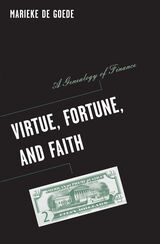

A denunciation of the credentialed elite class that serves capitalism while insisting on its own progressive heroism
Professional Managerial Class (PMC) elite workers labor in a world of performative identity and virtue signaling, publicizing an ability to do ordinary things in fundamentally superior ways. Author Catherine Liu shows how the PMC stands in the way of social justice and economic redistribution by promoting meritocracy, philanthropy, and other self-serving operations to abet an individualist path to a better world. Virtue Hoarders is an unapologetically polemical call to reject making a virtue out of taste and consumption habits.
Forerunners: Ideas First is a thought-in-process series of breakthrough digital publications. Written between fresh ideas and finished books, Forerunners draws on scholarly work initiated in notable blogs, social media, conference plenaries, journal articles, and the synergy of academic exchange. This is gray literature publishing: where intense thinking, change, and speculation take place in scholarship.

The internet has fundamentally changed how businesses reach their customers. Whereas historically it took a major, expensive marketing campaign to get the attention of potential customers, now digital visibility offers similar results on a much more modest budget. Visible! illustrates how by deploying the concept of “smart visibility” to show businesses and entrepreneurs how to more easily find their audience and build a brand.
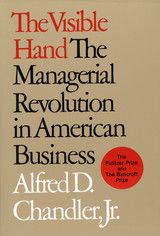
The role of large-scale business enterprise—big business and its managers—during the formative years of modern capitalism (from the 1850s until the 1920s) is delineated in this pathmarking book. Alfred Chandler, Jr., the distinguished business historian, sets forth the reasons for the dominance of big business in American transportation, communications, and the central sectors of production and distribution.
The managerial revolution, presented here with force and conviction, is the story of how the visible hand of management replaced what Adam Smith called the “invisible hand” of market forces. Chandler shows that the fundamental shift toward managers running large enterprises exerted a far greater influence in determining size and concentration in American industry than other factors so often cited as critical: the quality of entrepreneurship, the availability of capital, or public policy.

In Visions of the Press in Britain, 1850-1950, Mark Hampton argues that qualities expected of the contemporary British press--lively writing, speed, impartiality, depth, and the ability to topple corrupt governments by informing readers--are not obvious attributes of journalism but derive from more than a century of debate. He analyzes the various historical conceptions of the British press that helped to create its modern role, and demonstrates that these conceptions were intimately involved in the emergence of mass democracy in the late nineteenth and early twentieth centuries.
Hampton surveys a diversity of sources--Parliamentary speeches and commissions, books, pamphlets, periodicals and select private correspondence--in order to identify how governmental elites, the educated public, professional journalists, and industry moguls characterized the political and cultural function of the press. The resulting blend of cultural history and media sociology demonstrates how once optimistic visions of the press have given way to more pessimistic contemporary views about the power of the mass media.
With clarity and panache, this book shows that many competing conceptions continued to influence twentieth-century understandings of the press but did not remain satisfactory in new political, cultural, and media environments. Visions of the Press in Britain, 1850-1950 provides a rich tapestry against which to understand the contemporary realities of journalism, democracy, and mass media.

Ai Hisano exposes how corporations, the American government, and consumers shaped the colors of what we eat and even the colors of what we consider “natural,” “fresh,” and “wholesome.”
The yellow of margarine, the red of meat, the bright orange of “natural” oranges—we live in the modern world of the senses created by business. Ai Hisano reveals how the food industry capitalized on color, and how the creation of a new visual vocabulary has shaped what we think of the food we eat. Constructing standards for the colors of food and the meanings we associate with them—wholesome, fresh, uniform—has been a business practice since the late nineteenth century, though one invisible to consumers. Under the growing influences of corporate profit and consumer expectations, firms have sought to control our sensory experiences ever since.
Visualizing Taste explores how our perceptions of what food should look like have changed over the course of more than a century. By examining the development of color-controlling technology, government regulation, and consumer expectations, Hisano demonstrates that scientists, farmers, food processors, dye manufacturers, government officials, and intermediate suppliers have created a version of “natural” that is, in fact, highly engineered. Retailers and marketers have used scientific data about color to stimulate and influence consumers’—and especially female consumers’—sensory desires, triggering our appetites and cravings. Grasping this pivotal transformation in how we see, and how we consume, is critical to understanding the business of food.
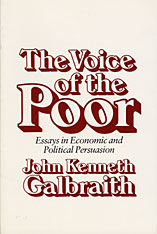

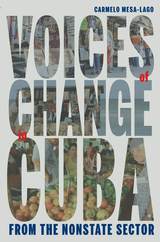
Based on eighty in-depth interviews recently conducted in Cuba, this book captures actual voices from this evolving economic sector. It details workers’ level of satisfaction with what they do and earn, profits (and how they are allocated between consumption and investment), plans to expand their activities, receiving foreign remittances and microcredit, competition, forms of advertising, and payment of taxes. Perhaps most revealing are the speakers’ views on the obstacles they face and their desires for change and improvement. As such, the book offers fascinating insights into today’s Cuban economy from the nonstate sector, while also reflecting on its potential for development and the obstacles it faces.

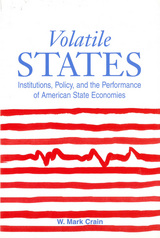

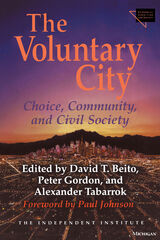
READERS
Browse our collection.
PUBLISHERS
See BiblioVault's publisher services.
STUDENT SERVICES
Files for college accessibility offices.
UChicago Accessibility Resources
home | accessibility | search | about | contact us
BiblioVault ® 2001 - 2024
The University of Chicago Press









